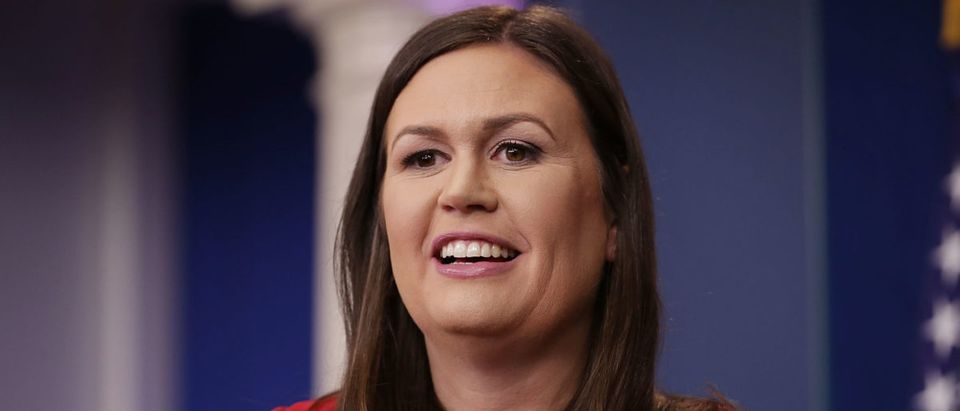Not enough people in America are working. Out of every hundred working age adults across the country, only 62 are either working or actively seeking work.
If America is to increase workforce participation, state leaders need to get serious about welfare reform. More state governors need to follow the example of Arkansas’ governor, Sarah Huckabee Sanders, and pass laws to ensure more stringent work requirements for those on welfare programs.
US workforce participation rates have fallen sharply over the past twenty years. So much so that in some states, such as my own Mississippi, almost half of all working age adults, 46 percent, have opted out of the labor market.
At the same time, the number of job openings has soared. At the end of last year, according to the US Bureau of Labor Statistics, there were an astounding 9 million job openings. (RELATED: DOUGLAS CARSWELL: DEI Is Destroying American Universities)
With so many unfilled jobs in America, and so many Americans not prepared to take them, immigrants have been flooding in – legally and illegally – to fill them.
Perhaps if Americans are serious about reducing immigration, we need to have a serious conversation about why so many Americans are apparently unwilling to take on the work that is there.
In poor states such as Mississippi we often hear the word “opportunity” thrown around by politicians as though it was some sort of talisman. Talk about “opportunity” often enough, they seem to believe, and everyone will become more prosperous.
Alas, this is not so. Mississippi already has 80,000 unfilled job vacancies. There is plenty of opportunity to work for anyone prepared to. The issue is why some folk aren’t taking the opportunities that are there?
Some state leaders have taken to suggesting that we hire more career counselors in high schools. While career counselors might do a wonderful job, if that is the only policy solution, I suspect labor force participation will remain low.
What state leaders need to do instead is ask difficult questions about welfare. Does welfare create disincentives against work?
Here in Mississippi, for example, approximately one in five (19 percent) of the 2.95 million population live below the poverty line (calculated as the minimum income needed to get by with the bare essentials).
How various assistance programs impact the half a million-plus people below the poverty line helps explain the appalling workforce participation rate, however taboo it might be to say so.
Welfare programs have unintended consequences, and one of them is the creation of so-called “benefit cliffs.” A benefit cliff is what happens when someone loses benefits if their income increases, but the benefits they lose outweigh the additional income gained.
Given the maximum income thresholds allowed, we know, for example, that if someone’s monthly income went from $400 a month to $410 a month, they would no longer qualify for some Temporary Assistance programs.
If your income rose above $1,215 a month, you could lose the right to claim Supplemental Nutrition Assistance Program (SNAP). When your income per person goes over $19,392 a year, you may no longer qualify for Medicaid (although the “cliff’”cut-off is not always as abrupt as is sometimes supposed).
Take into account the different benefit cliffs, and you could have a powerful range of disincentives.
It is not just Mississippi. According to West Virginia’s Cardinal Institute recent report, benefit cliffs in that state act as a powerful disincentive to taking on a job, too
Even if a person was notionally better off when holding down a 35 hour week job, the time and effort it would take for a relatively modest increase in income might leave some feeling having a job was not worth it.
So, what is the solution?
The answer to benefit “cliffs” is not to increase welfare payments in order to remove disincentives, but to institute more stringent work requirements for those on welfare programs.
In Arkansas under Sarah Huckabee Sanders, anyone that fails to accept a suitable job within five days of being offered one, or who fails to show up for job interviews without notice, can now lose their benefits.
If we are serious about increasing workforce participation, the next generation of state leaders across America will need to follow Arkansas’ example.
Douglas Carswell is the President & CEO of the Mississippi Center for Public Policy.
The views and opinions expressed in this commentary are those of the author and do not reflect the official position of the Daily Caller News Foundation.
All content created by the Daily Caller News Foundation, an independent and nonpartisan newswire service, is available without charge to any legitimate news publisher that can provide a large audience. All republished articles must include our logo, our reporter’s byline and their DCNF affiliation. For any questions about our guidelines or partnering with us, please contact licensing@dailycallernewsfoundation.org.


